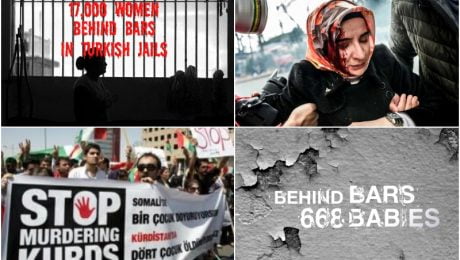Keyword: Human rights

HRW: Prosecutions of alleged followers of Gülen Movement lack of evidence of criminal activity
HRW report: “People continued to be arrested and remanded to pretrial custody on terrorism charges, with at least 50,000 remanded to pretrial detention and many more prosecuted since the failed coup. Those prosecuted include journalists, civil servants, teachers and politicians as well as police officers and military personnel. Most were accused of being followers of the US-based cleric Fethullah Gülen. Their charge often lacked compelling evidence of criminal activity.”

Turks Fleeing To Greece Find Mostly Warm Welcome, Despite History
Now, at least 1,000 Turkish citizens are seeking refuge in Greece, according to the refugee support nonprofit SolidarityNOW. It’s hard to pin down an exact number because not many have applied for asylum, says Antonis Spathis, a human rights lawyer in Thessaloniki. The Greek Asylum Service told NPR that 186 Turkish citizens applied for asylum in 2016 and noted there has been a “significant” increase in 2017.

AST urges foreign governments to ensure safety for participants of Hizmet Movement
Since the attempted coup of July 15, 2016 the Government of Turkey has engaged in illegal extraterritorial and extrajudicial actions been taking strict measures to silence dissidents in other countries from various ideologies recently. Participants of Gulen Movement -known also as Hizmet Movement- have been the main target of this global witch-hunt and abductions.

Pakistan’s Senate body to summon officials over missing Turkish family
The Senate Committee on Human Rights (HRs) of Pakistan on Thursday took up the issue of the disappeared Turkish family working for Pak-Turk Schools from Lahore and decided to summon relevant officials of federal and provincial governments in its next meeting.

The Muslim Cleric Who Fell in Love With Democracy
Gülen say, “The principles and form of government that form the basis of democracy are compatible with Islamic values. Consultation, justice, freedom of religion, protection of the rights of individuals and minorities, the people’s say in the election of those who would govern them…[are] principles espoused by both Islam and democracy.”

Turkish Gov’t Systematically Violated 12 Fundamental Rights During Emergency Rule
Sezgin Tanrıkulu, a deputy from Turkey’s main opposition Republican People’s Party (CHP), has announced that Turkish government has systematically violated 12 fundamental human rights during the ongoing state of emergency in the country.

UN Body Asks Immediate Release Of Arbitrarily Jailed Police Chief
The United Nations’ Working Group on Arbitrary Detention (WGAD), which works under UN Human Rights Council, has called on Turkish government to immediately release police superintendent Kürşat Çevik who are arbitrarily arrested and still kept in Şanlıurfa prison over his alleged links to the Gülen movement and accord him an enforceable right to compensation and other reparations in accordance with international law.

Washington Post on Erdoğan’s purge: Cruel frenzy in march towards authoritarianism
Mr. Erdogan, the Turkish president who was the target of a failed coup last July, has since carried out a wave of arbitrary punishments and imprisonments of thousands of journalists, academics, bureaucrats, lawyers and human rights defenders he suspects of affiliation with Mr. Gulen and his movement. This cruel frenzy is just the latest step in Mr. Erdogan’s march toward authoritarianism.

PACE concerned over lack of domestic remedy for purge victims in Turkey
Two rapporteurs for the Parliamentary Assembly of the Council of Europe (PACE) on Wednesday expressed concern at the apparent lack of an effective domestic remedy for persons who have been dismissed from their jobs, arrested or detained by the Turkish authorities.

Civil death: Amnesty report on social upheaval caused by Turkey’s purge of public servants
“Tainted as ‘terrorists’ and stripped of their livelihoods, a large swathe of people in Turkey are no longer able to continue in their careers and have had alternative employment opportunities blocked,” Andrew Gardner, Amnesty International’s researcher on Turkey.






















